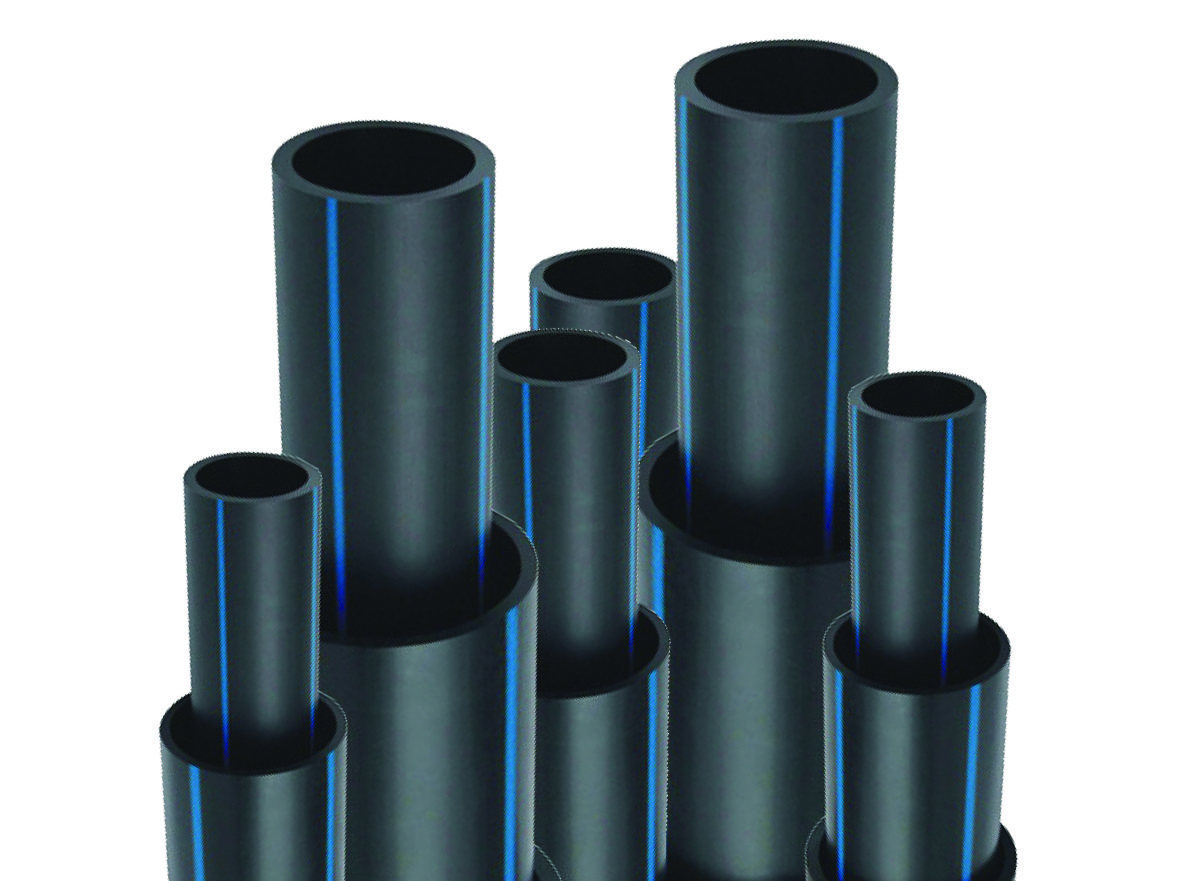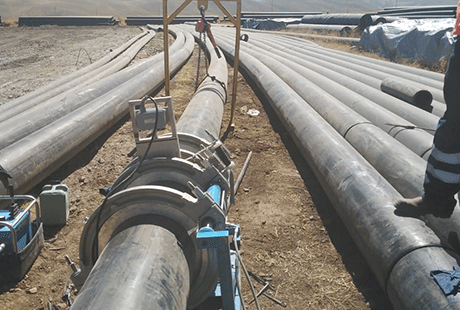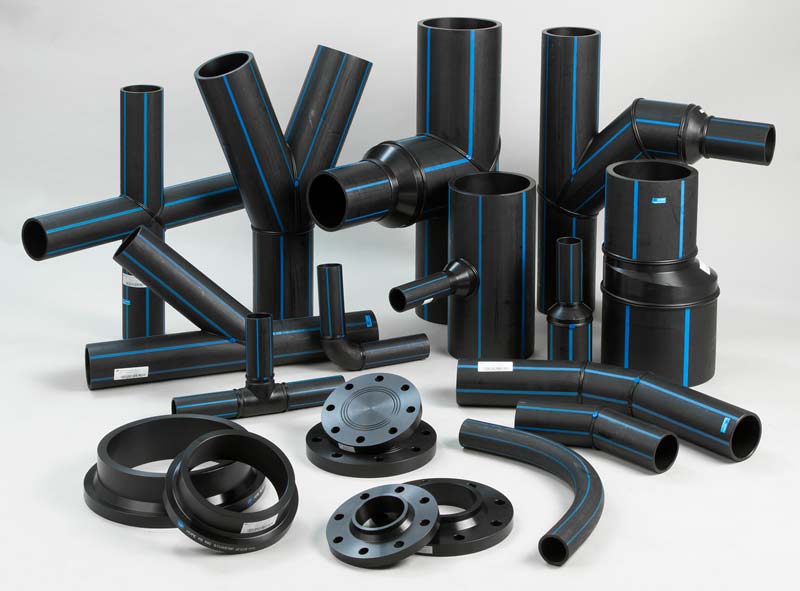Exploring the Leading Pipeline Manufacturers: High Quality, Reliability, and Technology
The pipeline manufacturing market stands at the crossway of dependability, high quality, and advancement, driven by leading companies such as Tenaris and Vallourec. These makers are not just dedicated to producing high-performance products yet are also pioneering lasting methods that attend to modern-day environmental problems (HDPE Pipe Supplier). As we examine the standards that define quality in pipeline services, it ends up being evident that the landscape is quickly advancing. What particular technologies are emerging, and how are these developments forming the future of pipeline infrastructure? The solutions may redefine sector standards in manner ins which are not yet totally comprehended
Leading Manufacturers Summary
In the domain of pipeline manufacturing, a number of principals emerge as leaders, each contributing significantly to the market's landscape. Firms such as Tenaris, Vallourec, and JFE Steel have established themselves as frontrunners by constantly providing premium items that meet strict sector standards. Tenaris, renowned for its cutting-edge services, focuses on smooth and bonded pipelines, catering primarily to the oil and gas field. Vallourec, a French international, concentrates on the production of premium tubular options, stressing sustainability and advanced modern technology in its manufacturing procedures.
JFE Steel, a significant Japanese manufacturer, is recognized for its comprehensive variety of steel pipelines, particularly those utilized in energy and infrastructure tasks. Their dedication to r & d has enabled them to create high-performance materials that stand up to harsh ecological problems. Furthermore, companies like U.S. Steel and National Oilwell Varco have actually broadened their market visibility by diversifying their product offerings and boosting functional efficiencies.
These leading makers not just control the market however additionally drive technology within the sector, establishing criteria for top quality and reliability that other gamers aspire to attain. Their contributions are important for meeting the enhancing demand for long lasting and efficient pipeline solutions worldwide.
Criteria for Quality Evaluation
Quality evaluation in pipeline manufacturing depends upon 2 important criteria: material toughness criteria and producing process efficiency. Ensuring that materials meet rigorous resilience criteria is important for the durability and dependability of pipes. Additionally, enhancing the manufacturing procedure can enhance performance while preserving premium quality, eventually influencing general efficiency and safety.
Material Sturdiness Criteria
Ensuring the durability and reliability of pipeline materials is important for preserving facilities stability and operational effectiveness. Material sturdiness requirements play a crucial duty in examining the top quality of pipes, determining the performance and life expectancy of the materials utilized in building. Manufacturers have to stick to a variety of rigorous requirements, including those set by companies such as ASTM International and the American Oil Institute (API)
These requirements evaluate various factors, consisting of rust resistance, tensile toughness, and fatigue efficiency. Pipelines used in harsh atmospheres require products that can endure chemical destruction, while those subjected to high-pressure problems should display phenomenal tensile strength.
Furthermore, variables such as temperature changes and ecological problems have to be thought about, as these can substantially affect product behavior in time. Manufacturers commonly make use of advanced testing methodologies, including sped up aging examinations, to replicate long-term wear and assurance that products go beyond or meet industry benchmarks.
Manufacturing Process Effectiveness
Manufacturers' capacity to maximize producing procedure effectiveness is vital for creating top quality pipes that meet strict sector requirements. Effectiveness in manufacturing directly affects price management, production timelines, and total item honesty. To attain this, leading pipeline producers apply sophisticated strategies such as lean manufacturing, automation, and real-time information analytics.
Lean manufacturing principles are essential in reducing waste and making best use of resource utilization. By improving procedures and eliminating redundancies, makers can enhance productivity while making certain regular quality. Automation innovations, consisting of robotics and computer system mathematical control (CNC) equipments, play a crucial role in improving accuracy and reducing human error, thus elevating the integrity of the final product.
Additionally, using real-time data analytics allows manufacturers to keep an eye on manufacturing processes continually, enabling them to recognize traffic jams and make timely adjustments. This proactive technique not only improves effectiveness but also sustains quality control protocols by making sure conformity with governing requirements.
Reliability in Pipeline Solutions
Dependability in pipeline remedies is extremely important, as it straight influences the safety and efficiency of liquid transport systems. Key elements consist of the longevity of materials used, adherence to rigorous screening and accreditation criteria, and the unification of cutting-edge material remedies that enhance efficiency. Understanding these components is vital for suppliers intending to provide reliable pipeline framework.
Value of Resilience
Attaining toughness in pipeline services is vital, as it straight impacts the lasting performance and security of facilities. Resilient pipes are vital for reducing upkeep costs and lowering the possibility of disastrous failures. This dependability is especially crucial in sectors such as oil and gas, water supply, and wastewater management, where the effects of pipeline failing can be serious, both economically and environmentally.
The products and making procedures utilized by pipeline producers play a significant role in determining the resilience of the end product. Making use of top quality resources, progressed technologies, and ingenious style concepts assures that pipelines can endure different stress factors, consisting of stress variations, temperature variations, and corrosive settings.
Moreover, the resilience of pipes is very closely connected to their capacity to stand up to exterior aspects such as dirt motion, seismic activity, and chemical exposures. Efficient deterioration security techniques, such as layers and cathodic security, even more enhance the durability of pipes, securing them against wear and tear gradually.
Spending in durable pipeline services eventually translates to raised functional effectiveness, decreased downtime, and enhanced safety and security, attesting the critical importance of durability in modern-day pipeline manufacturing.
Checking and Qualification Standards
In the domain of pipeline remedies, rigorous testing and accreditation requirements are vital to assure the integrity and safety of framework. These criteria function as criteria for examining the performance and durability of pipeline materials and systems, verifying they satisfy details regulatory and industry demands.
Checking procedures generally incorporate different methodologies, consisting of pressure screening, hydrostatic evaluations, and non-destructive screening techniques. These analyses are important for recognizing potential weak points or issues in the materials prior to they are deployed in real-world applications. Furthermore, accreditation by identified companies assurances that manufacturers comply with developed guidelines, which promotes count on amongst stakeholders, including designers, end-users, and service providers.
Many top pipeline manufacturers participate in constant monitoring and improvement of their testing procedures to adjust to progressing industry criteria and technical innovations. Conformity with standards such as ASTM, ASME, and ISO not only improves item integrity but also reduces the danger of ecological cases connected with pipeline failings.
Ingenious Material Solutions
The advancement of innovative product options has transformed the landscape of pipeline manufacturing, enhancing both performance and sturdiness. Advanced products such as high-density polyethylene (HDPE), cross-linked polyethylene (PEX), and composite products have actually emerged as game-changers, offering premium resistance to deterioration, temperature level fluctuations, and stress variations. These products not just expand the life expectancy of pipelines however likewise decrease maintenance expenses, guaranteeing reliable long-term efficiency.
Moreover, suppliers are progressively embracing wise materials that include sensing units for real-time tracking. This technology permits aggressive upkeep, substantially boosting dependability by discovering leaks or architectural weak points before they escalate you can look here right into vital failings. The integration of nanotechnology has actually also resulted in the growth of finishings that boost the durability of pipelines against abrasion and chemical exposure.
Sustainability is another essential emphasis, with producers discovering bio-based composites and recyclable products that reduce environmental influence. As regulatory criteria continue to advance, the emphasis on ingenious material remedies becomes extremely important in meeting rigid safety and environmental requirements. Inevitably, these innovations not just improve the dependability of pipeline systems but also contribute to the overall effectiveness and sustainability of energy transportation infrastructures.
Developments in Pipeline Technology
Innovations in pipeline modern technology are changing the market by improving efficiency, safety and security, and ecological sustainability. Recent developments concentrate on wise pipeline systems that use sensors and IoT modern technology to monitor conditions in real time, making it possible for proactive maintenance and minimizing the threat of failings. These systems can spot leakages, stress adjustments, and other anomalies, enabling fast action and reducing ecological influence.
In addition, the growth of advanced products, such as composite and corrosion-resistant alloys, significantly expands the life-span and reliability of pipes. Pipeline Manufacturer (American Plastics LLC HDPE Pipeline Manufacturer). These materials reduce upkeep prices and improve performance in rough settings, making them optimal for water, gas, and oil transportation
In addition, automation and robotics are playing an important function in pipeline building and construction and examination. Drones and robot gadgets help with studies and analyses of hard-to-reach areas, making certain thorough assessments without endangering safety and security.
Ingenious designs, such as modular pipeline systems, allow for greater versatility in installment and adjustment, providing to the vibrant requirements of the energy industry. Together, these technical innovations not just improve operational performance but also add to a much more lasting and resilient pipeline framework, leading the way for a greener future.
Study of Success
Throughout various fields, successful executions of advanced pipeline modern technologies demonstrate significant renovations in operational effectiveness and safety. One significant situation is the deployment of wise pipeline surveillance systems in the oil and gas industry, where real-time data analytics have minimized leakage detection times by over 50%. This not only reduces environmental dangers but likewise enhances the total honesty of pipeline infrastructure.

Additionally, a significant manufacturer carried out robotic evaluation technologies in its pipeline maintenance operations, causing a 40% renovation in assessment efficiency. This approach has structured maintenance routines and significantly reduced downtime.
These case studies highlight how top pipeline suppliers are leveraging cutting-edge modern technologies to cultivate dependability and operational excellence, ultimately establishing brand-new requirements for the sector. As these successes proceed to unravel, they pave the method for further developments in pipeline manufacturing and management.

Environmental Sustainability Practices
Frequently, pipeline manufacturers are prioritizing ecological sustainability methods to mitigate their ecological footprint and improve the durability of their items. This dedication is reflected in different efforts targeted at reducing waste, conserving energy, and utilizing sustainable products throughout the manufacturing procedure.

Numerous producers are adopting sophisticated innovations that lessen discharges and power usage. The combination of automated systems and energy-efficient equipment aids simplify manufacturing while decreasing dependence on fossil gas. Additionally, companies are significantly transforming to environment-friendly materials, such as recycled metals and bioplastics, which not only decrease the ecological influence but also promote a circular economy.
Pipeline producers are implementing strenuous lifecycle evaluations to assess the environmental effects of their products from inception to disposal. This strategy enables them to recognize possibilities for renovation and foster responsible sourcing and waste management practices.
Cooperation with ecological companies better boosts these efforts, as suppliers seek to straighten their operations with international sustainability objectives. Eventually, these environmental sustainability practices not just add to a much healthier world but also setting producers as liable leaders in the market, appealing to environmentally mindful stakeholders and customers alike.
Future Patterns in Pipeline Manufacturing
As the demand for much more lasting and efficient framework grows, pipeline manufacturing is poised for substantial advancements that will certainly reshape the market. Trick trends expected in the coming years consist of the integration of sophisticated products, such as composite and corrosion-resistant alloys, which enhance longevity while reducing ecological influence. Manufacturers are also expected to adopt ingenious manufacturing strategies, like additive manufacturing and automation, to streamline processes, minimize waste, and reduced prices.
The increase of smart pipeline modern technologies, incorporating sensing units and IoT gadgets, will certainly allow real-time tracking and predictive upkeep, thereby enhancing safety and security and functional efficiency. This digital transformation will not just enhance resource administration but additionally facilitate compliance with strict ecological guidelines.
Sustainability will remain a central emphasis, driving makers to buy eco-friendly methods, including energy-efficient production methods and recycling initiatives. As the international focus on environment modification escalates, pipeline suppliers will certainly require to adapt by establishing options that satisfy both economic and environmental demands.
Often Asked Questions

What Industries Mainly Use Pipeline Products From These Manufacturers?
Pipeline items are mainly utilized in sectors such as oil and wastewater, water and gas management, chemical building, handling, and mining. These industries count on efficient, resilient, and secure transportation of materials and fluids.
Exactly How Do Manufacturers Guarantee Conformity With International Pipeline Standards?
Manufacturers guarantee compliance with worldwide pipeline requirements by implementing rigorous high quality control procedures, conducting routine assessments, sticking to well-known governing structures, and purchasing employee training to promote understanding and understanding of safety and security and high quality needs.
What Is the Average Life-span of Pipelines From Leading Manufacturers?
The ordinary life-span of pipelines from leading producers typically ranges from 30 to 100 years, depending upon product, environmental conditions, and maintenance practices. American Plastics LLC HDPE Pipeline Manufacturer. Normal inspections and adherence to industry criteria markedly affect longevity and performance
Exist Certifications Certain to Pipeline Manufacturing Quality?
Yes, numerous qualifications exist for pipeline producing quality, consisting of ISO 9001 for high quality administration systems and API standards details to pipes. These accreditations guarantee adherence to strenuous security, performance, and ecological requirements within the market.
Exactly How Do Manufacturers Handle Pipeline Upkeep and Repair Works?
Manufacturers generally apply a positive maintenance approach that includes normal inspections, keeping an eye on systems for very early detection of issues, and an organized repair service procedure. This method guarantees pipeline integrity, decreases downtime, and boosts overall functional performance.
Quality assessment in pipeline manufacturing hinges on 2 important standards: product longevity criteria and making process effectiveness - HDPE Pipe Supplier. Material resilience standards play an essential role in evaluating the top quality of pipelines, determining the efficiency and life-span of the materials made use of in construction. The products and producing processes utilized by pipeline makers play a considerable duty in identifying the sturdiness of the final product. The typical life-span of pipelines from leading suppliers generally varies from 30 to 100 years, depending on material, ecological problems, and upkeep methods. Yes, various accreditations exist for pipeline manufacturing high quality, consisting of ISO 9001 for top quality management systems and API criteria details to pipes